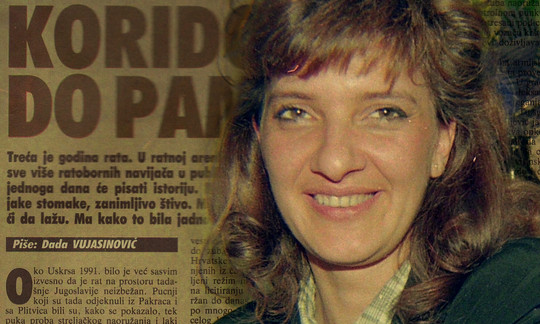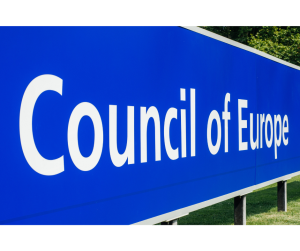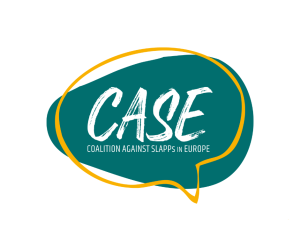What if the dogs of war kill you and then fake it as if you had committed suicide? What if a dirty machine was used to cast a shadow over your truthful articles to prove that something was mentally wrong with you? It would stick. You are a woman.
Her first name was Radoslava Dada Vujasinović. Her last name was 一 a brave journalist.
She reported from the battlefield in Bosnia and Herzegovina, for the Serbian magazine Duga on war and organised crime she witnessed. She was only 30 years old when she was found dead on April 8th, 1994 in her apartment at number 118 on Third boulevard in the municipality of New Belgrade in the Serbian capital.
Her family and friends never agreed with the official version, that she pointed a hunting rifle to her chest and shot herself. Constant insistence on a transparent investigation, to identify perpetrators and masterminds and to launch an indictment, only led to a dead end. Due to the passage of time and apparent obstruction, this year the quest for truth lost every judicial chance.
The statute of limitations is final.
From the black box of Serbia, with 128 attacks and pressures on reporters registered since the beginning of 2025 according to the Independent Journalists’ Association (IJAS-NUNS) and with absolute impunity for the killings of journalists between 1994 and 2001, the hope for the truth has long since evaporated.
Criminal octopus
“With the wars of the 90s, almost the entire media landscape in Serbia supported the version formulated by the then president of Serbia, Slobodan Milošević: Serbia is not at war and the Croats and Bosniaks are always to blame, he repeated. By birth, Dada Vujasinović was from Bosnia, so she understood very well the environment in which the war broke out. Immediately, she applied to be a war reporter, which was very unusual. She was very young,” remembers Vesna Mališić, a veteran editor and journalist and Dada’s friend:
“She didn’t go to the front to report on the war; she went to depict life.”
When speaking about Dada’s reporting, Serbian veteran journalists always highlight her incredibly accurate reporting and storytelling, as well as her portrayal of the wickedness, sinfulness, malignity, and cruelty of the war. These were not the news reports of a journalist sitting on the Serbian side, only noting the crimes of “the others”. Her pen bore witness to the destinies of people.
“Dada revealed what war brings to people and how a criminal octopus is established in a war that crosses the borders of “mine and yours”. Very quickly she started talking about how ideals were being sold for various things. Secret services played a vital role in facilitating that criminal octopus by organising several types of paramilitary and criminal groups. Today, we still feel their tentacles, but in the peacetime version”, explains Vesna Mališić, the editor-in-chief of the independent weekly “Radar”, who points out:
“Dada wrote about Erdut, (a village in Croatia where the paramilitary and notorious Serb Volunteer Guard committed war crimes between 1991 and 1992, and where it established its training camp). She wrote about generals making crazy decisions, and how Serbian paramilitaries’ chaotic shooting sprees caused Serbs to be injured. Her stories brought the reality of life in the war, while she did not close her eyes to what Serbs themselves did. She showed the full picture”.
When censorship of her articles began, she gave up reporting from war zones and focused on Sandžak, a border area between western Serbia and Bosnia and Herzegovina.
“And that’s where she came across what I think cost her life. It wasn’t “classic” smuggling, which brought together Serbs, Croats and Bosniaks. It was state corruption. The secret services were reselling weapons, regardless of the buyer’s nationality. Dada published an article on this illegal arms trafficking, but there was a lot of information she couldn’t publish,” said Vesna Mališić.
Green folder
Dada lived under constant threat. During the day, threats came to the newsroom; at night to her landline at home. As a clear and frightening message, a dead bird was left in her car. She was threatened by Željko Ražnatović Arkan, a Serbian warlord, and head of the paramilitary Serb Volunteer Guard.
“We were supposed to meet, and she didn’t show up. In the evening, Dada’s mom called in panic. Then, we started to search,” remembers Vesna Mališić.
Dada’s boyfriend found her lying on the floor, in the middle of her living room, 20 cm away from the armchair where she had bled to death.
“The police came, but without an investigating judge, which is unthinkable. The initial police investigation concluded that she shot herself. However, from the position of the body it was quite clear that this could not have been the case. A long rifle was placed next to her. This would have meant that she had shot herself, bled on the armchair and then moved to the floor. Furthermore, there were other details that suggested Dada could have been murdered, such as the hair that was found behind the armchair. But those investigating the case were in a rush to close it,” points out Mališić and underlines:
“Dada’s parents made huge efforts for the case to be re-opened, but it is obvious that the state did not want it. As soon as Dada’s mother entered the apartment, she asked for a green folder with documents that her daughter had collected. Dada had also recorded many conversations, including with people from the secret services. A lot of this disappeared, and Dada certainly did not throw it away.”
Veran Matić, the president of the Commission for the Investigation of Murders of Journalists in Serbia, underlines that the murder of Dada Vujasinović was the most difficult to investigate, both because the police and the prosecutor’s office immediately concluded that she had committed suicide. However, the journalist’s family hired an expert who disputed the official version, concluding that it was a case of murder.
“At the Commission, we asked for the evidence that was collected at the crime scene in 1994 and requested the intervention of external experts to examine the case. A series of poor investigative work followed: the police said that this file had disappeared. Following our insistence on determining responsibility, a bag with evidence was found. The state paid for an analysis at the National Forensic Institute in the Netherlands, and the conclusion was that there was not sufficient evidence to determine how Dada’s death occurred: It could have been a murder, or suicide, or accidental shooting”.
After that, everything related to the investigation stopped.
“It’s a great conspiracy of silence”, Matić adds: “Her death is related to the culmination of dark crimes in the name of the government of Slobodan Milošević, the synergy of the state security that formed the paramilitary units, the paramilitary forces symbolized by Serbian warlord Arkan, and the conflict in the incompetent military leadership. My impression is that all of them, together, influenced the death of Dada Vujasinović.”
“At the end, it is a triumph of the deep state. No one will have an objection of conscience. These systems are so cruel that it is probably this cruelty that keeps them from ever speaking up. We still live with that today”, Vesna Mališić said explicitly.
Dada was killed
Impunity for the crimes of the past paves the wave for the violent atmosphere we live in.
Looking back, Matić observes that the escalation of violence and threats that is happening in Serbia today reminds him of the time when journalists Dada Vujasinović, Slavko Ćuruvija and Milan Pantić were killed. He is very worried about the possibility of similar attacks.
We preach – Reporters must be accurate, objective and unbiased at all times.
We note – While reporting on corruption, journalists face threats and huge risks.
We whisper – Keep your head down. A journalist has been killed.
The European Federation of Journalists (EFJ) passed a motion on persistent impunity, escalating threats and ongoing assaults on journalists in Serbia in its 2025 General Meeting. Delegates from across Europe expressed grave concerns over the increase of physical and other forms of violence against reporters in Serbia, pointing to physical attacks and dozens of verbal threats and acts of violent intimidation, including: illegal digital surveillance, while the police either remain passive observers or remove and arrest reporters, instead of the attackers.
In European Serbia, her first name was Radislava Dada Vujasinović. What would be her last name today?
We must not forget. We must stand together. We must act.
Source: IFJ




